Gabriel van Aalst is the President and CEO of Dayton Live, the region’s home for performing arts, culture, and live entertainment. With a journey that started in Australia and weaved through nearly every continent on the planet, Gabriel finally landed in Dayton, Ohio, in September 2024, lured to our city by our vibrant arts culture and passionate community support.
Listen to learn more about Gabriel and his vision for fueling the next generation of the arts in Dayton.
Listen Now
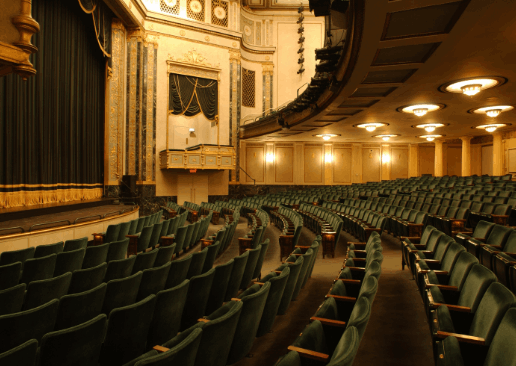
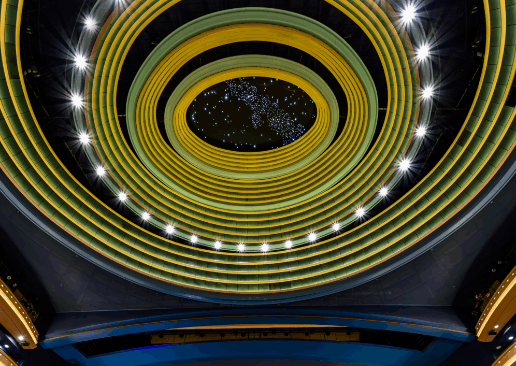
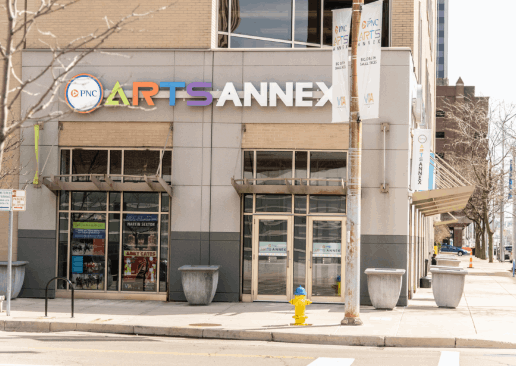
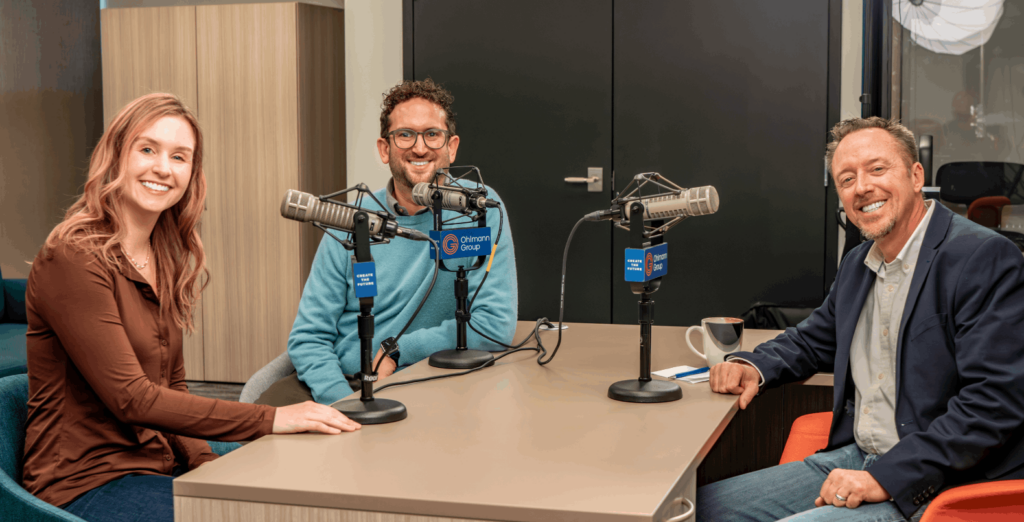
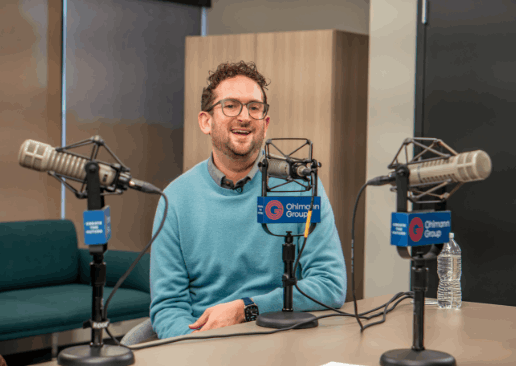
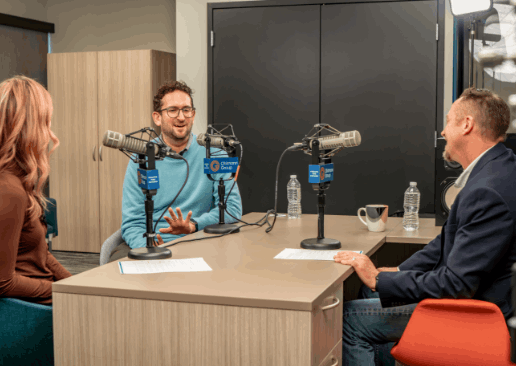
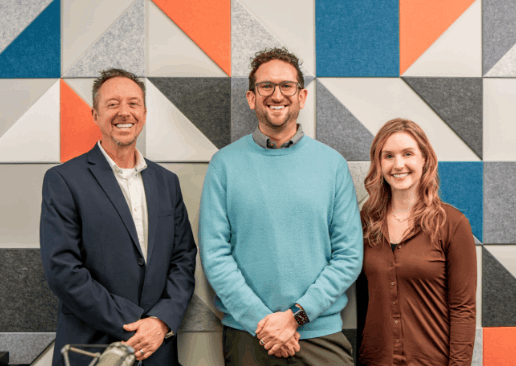
Episode Transcript:
David Bowman: Welcome to Creating the Future. I’m David Bowman —
Evelyn Ritzi: And I’m Evelyn Ritzi.
David: And today we are joined by Gabriel van Aalst, President and CEO of Dayton Live, which is the driving force behind hundreds of performing arts, culture, and entertainment events in the heart of downtown Dayton. Gabriel, welcome. Thank you for being here.
Gabriel van Aalst: Thank you so much for having me. It’s great to be here.
David: Well, we are so excited to welcome you to Dayton and to learn more about you. So could you tell us a little bit about your background?
Gabriel: Sure, as you can probably tell from my accent. I’m a native Daytonian (laughs). I’m actually from Sydney, Australia. I grew up there, and in 2011 I actually left Sydney and I moved to London. And, originally it was intended to I had been working for a long time in Australia, largely in like in touring arts and orchestras all around the country and the world. And I was like, after all this time working, I’m ready for a really rigorous academic experience. And I promised myself, I’m not going to work. I got into King’s College and moved to London, and immediately one of the jobs of my dreams came available, and I was like, Well, I have to do that. And then five years later, I had been traveling the world with the Academy of Samana fields, which is a chamber orchestra based out of London, but it’s sort of the world’s orchestra. And then the opportunity to came up to move to New Jersey and run the New Jersey Symphony, and it was one I really couldn’t pass up. They had just appointed a fantastic new music director, Shen Zhang. Shout out to Shen. She’s absolutely incredible. And I saw an opportunity there that I really wanted to take up. And moving to America was also one of these bucket list items. And I was there for eight years, and loved every moment of it. And then the tap on the shoulder came about Dayton Live. And, you know, I would be honest, I hadn’t been to Dayton before, and but the more I researched about Dayton Live, and I’m sure we’re going to talk about it a little bit, the more excited I got about the opportunities here. It’s such a fantastic center. We present so many amazing acts, Broadway with a home for five resident companies. And the opportunities here were just so incredible that I couldn’t turn them down. And, you know, I’m also basically making my way around the world, back to Sydney. So my mom’s getting happier because I’m getting closer to her every day.
David: That’s awesome. So have the arts always been a part of your life?
Gabriel: Yes, they have. So I grew up playing violin and piano and a member of the Australian theater for young people. And, you know, I was that, quite frankly, I was That poor kid that was on scholarships that would be trotted out and be like, Look how the arts can impact people. And, you know, I say it significantly, but it’s also really, really true, because I wouldn’t be here today without arts education programs, without opportunities that I couldn’t afford to have, that people who were inspired through philanthropy or social justice, maybe is the wrong word, but like social welfare programs to provide access to the arts for young kids and so, you know, growing up, I, you know, at various times, I got into Conservatorium, the Conservatorium in Sydney. But ultimately I decided to go in sort of a more academic area. And then when I finished school, I wasn’t really sure what to do. And in Australia, the universities work a bit differently than here. You have to choose your sort of major before you go into and whether you get into your major is dependent on the scores you get at school, and, you know, I got good scores, and that one of the you either choose, if you get good scores, you choose medicine or law. And I was like, okay, but I don’t really know if I want to do this. So I did law and filmmaking at undergrad, and really fell in love with this, really fell in love with filmmaking and content creation, but that live performing arts was at the core of who I was, and so I sort of took those skills and ended up sort of working in the performing arts, but it was the arts have always been sort of at the core of who I am. And you know, we make people happy, we provide people with joy, we inspire people to live their best life. Lives through, you know, things that we do on stage, and that’s just such a wonderful thing to have experienced as an individual, and it’s a wonderful thing to impart on people through my work.
Evelyn: Absolutely, that’s amazing. And we’re so we’re so, frankly, blessed in Dayton to have Dayton Live and to have so many great arts organizations. And of course, Dayton Live is a huge part of that. Can you talk about why you were drawn to this region, this position, this role?
Gabriel: Yeah, as you said, you know, this is such a blessing for Dayton to have such an arts engaged community. And it’s not even just about I don’t want to say it’s a blessing to have Dayton Live, but what I saw when I was first, sort of asked, you know, to consider this is I sort of started Googling on the website, as you do. And, you know, first you’re like, well, Dayton, what I don’t know much about it, yeah. And then suddenly I’m realizing, well, we have all these Broadway weeks, and wait, 400,000 people come through Dayton live every year, and there are five resident companies. And wait, the population of Dayton is only about 850,000 that means, like every one in two people come through Dayton Live every year, and as someone who, as you can probably tell, is a bit arts-obsessed, that sort of community engagement doesn’t happen everywhere in the world. And so there’s something really special happening in Dayton that can support the arts community as broad as we have here. And so the more I dug into it, the more I was sort of inspired by the way the community has embraced Dayton Live, and the opportunities that we have at Dayton live to sort of leverage that and provide even more access to people. Because no matter how many, no matter how many of the population where, if we have 400 people, 1000 people coming through, or close to 450,000 people coming through every year, we’re still leaving some people behind. So what can we do to invite more people into our space and go out into the community more? And that became a really exciting question and challenge that, you know, really drew me here. And the other piece of it is the people of Dayton are so welcoming. And, you know, I can be Australians are really direct, and I’ve lived on the East Coast for eight years, so like, you get a marriage of directness and directness, and then I’m now in the Midwest, full of surrounded by people who are absolutely lovely. And I’m realizing that I am also have the capacity to be a less a little less direct, a little bit more lovely, but the people are great here, and that’s been a real delight.
David: So aside from maybe a goal of being more lovely, what are some of the other goals you have, sort of in your first year here in Dayton and with Dayton Live?
Gabriel: You know, for me again, it comes back to my experience growing up, and I see, I think we have a responsibility to increase our community engagement work and make sure that everyone understands that Dayton Live is a place for everyone, and even though our building literally has a glass wall that tries to remove the divide between the inside and the outside. I think we have a responsibility to emotionally break that wall down, because it still does exist. So I think for me, one of the things I’m looking at is, how can we partner with other organizations around the community to open up opportunities within Dayton Live. And that doesn’t that’s not necessarily meaning, you know, coming on, being on stage, but, you know, just last week, I met with the folks from We Care Arts, and they have amazing like Christmas market material there the the their participants and their programs create artworks for the festive season. And immediately I was like, we have to get you down to sell these around our festive season shows. And so, like, it’s partnerships like that with great organizations in the community that I want to see more and more of. And also just obviously, we want to continue to bring the best of the world’s arts to Dayton and make sure that this is a place where not just we recognize how special it is, but acts coming in recognize so they come back and we create and continue to support this thriving arts community. And of course, there’s that other thing, which we’re going to probably talk about a bit later, which is just this small thing called the NATO Parliamentary Assembly that is keeping many of us awake at night, but it’s truly an honor for us to be having that in our space as one of the host organizations. So you know, in our first year, if we can continue to bring the best of the world’s arts here, if we can continue to support and partner with community organizations from all across the region, and if we. And pull off the NATO Parliamentary Assembly, I will be able to sleep well at night, and maybe a bit night. What was – not nicer? I think I’m pretty nice, lovely, lovely, and a bit more lovely as well.
Evelyn: I think you’ve already nailed that. You know, we’re always curious about folks who are new to Dayton, who choose to live here, what you what you like about this community in terms of even the lifestyle, the restaurants, the activities, the things to do. Have you discovered any hot spots that you’d like to shout out.
Gabriel: There was this meme in the tri-state area, I think was everywhere. But I want to say, like, two summers ago, and people would go on Instagram, or there would people go on Twitter, and they say New York’s hottest nightclub is and then it’ll be Dotto dot and like, the men’s room line at blah, blah, blah. And you know what I will say, Dayton’s hottest bar nightclub is the bar at Dorothy Lane (Market) on a Friday night, that place is wild. You know, in Australia, the liquor licensing laws means you can’t buy alcohol in a department in a grocery store. It has to be in a liquor store, and you certainly couldn’t drink it while shopping. And, you know, in New Jersey, it’s the same. So coming here, it’s like, what is this miracle land? So that’s been really fun. It’s bad for the bank account, but it’s really fun. You know, I also really love SeaJax Tavern, where quite we found that and fell into it, and really loving that. And, you know, there’s lots of great restaurants as well that we’ve been exploring. Oh my gosh, I’m going mad. Suneo is incredible. And you know, when my partner and I were coming here to sort of decide, are we going to live here? We by chance. It was probably by design, because the board had been like, you should go to these places. When you listen we walked in, was like, this place is incredible. And so, and then, you know, Tender Mercy is great as well, but Wheat Penny. Big soft spot for Wheat Penny’s brisket sandwich. Oh my gosh. Quite often before a show, I’m sitting at the bar there because it’s just far enough away from Dane Live to be able to race wolf down a sandwich without trying to sort of talk to 17 people. I’m giving away my secrets. Don’t go there before a show, please. I want to be able to sit at the bar, but the brisket sandwich is definitely one that I’ve enjoyed. But, you know, I have a dog as well. And you know, the hikes around have been really nice, hiking around as well, especially in the in the autumn, it’s been just a beautiful maybe not today, when it’s minus well, minus seven doesn’t mean anything to you. It does, but it means something different to you. But I’m gonna say around like 15. Are we 15 today? Something like that today? Yeah.
David: So as we all know, the arts are a really big part of Dayton’s cultural and economic vibrancy. So how do you envision Dayton Live continuing to contribute to the impact, especially when it comes to bringing people downtown.
Gabriel: Yeah, absolutely. You know, I hope that we play a big part in bringing people to downtown. So, as I was saying earlier, you know, 400,000 people come through our doors. More than 400,000 people come through our doors every year. And one of the things I’m thinking about, and if I had a solution, I’m not smart enough to already have a solution two months into the into the role. And lots of smart people have been thinking this for a long time. But the big question that we have to face is, how do we get those people to stay? How do we get people to stick? And I don’t know if this was a conscious decision or unconscious decision, but I love the fact and lots of people probably don’t, especially when days has called us today that the car park is not part of our building, because that forces people to leave the building. And there is a moment where there’s a decision to be made, am I walking straight to my car or am I going to do something else? So one of the things that we’re thinking about at Dayton Live is, how do we partner with organizations around us to encourage either before or after coming down to one of our great venues to see a show or hear a concert? How do we get them to stay in town? How do we get that to be sticky? And you know, we have a few ideas that we’re going to be experimenting with and one of the great things that I have the joy of is Ty my predecessor did an incredible job of making sure that this was a fiscally sound organization, which is not a common thing in the arts world, which allows us to play now with ideas like this. We have our we have our house in order. So how can we use our ordered house to support other organizations? Because we do operate over four blocks in downtown Dayton, we’re one of the largest activated real estate spaces. And you know, I hope that in a couple of year’s time, there will be this contiguous line between, between us and the Arcade of activated space, and a contiguous line between us and the baseball field of activated space. So there’s no question about, is there something to do downtown? But it’s hard, and you have to take steps, and there will be mistakes along the way, and we have to do this together as a community. You know, we want this to be successful as a community. That’s one of the things I’ve heard about a lot. So it’s about partnerships. It’s not about us doing it alone, and that’s going to take time to develop. And we’re looking forward to working with the city and Downtown Dayton Partnership and the local businesses as well.
David: It’s so interesting because you got like the Levitt, and you’ve got Dayton Live and the Dragons, which draw people to downtown, but you also have employers who are increasingly either fully remote or in hybrid work situations, which means on a day to day perspective, Monday through Friday, there are less people kind of roaming, walking around the streets, just going through life, they’re more likely in sweat pants at home, doing the laundry while they’re on a Zoom call.
Gabriel: I miss those days.
David: So I think that it really emphasizes the importance of the arts community, Dayton Live and the broader community to sustain that viability of a downtown right? And it’s gonna evolve into something different than it had been in the past, pre-COVID. But I think it’s, I don’t know, that people understand the importance that the arts community has in that transformation, right? It’s, it’s really interesting, I think,
Gabriel: And I think, you know, to that point, lots of cities talk about being art cities, but we really, in Dayton have the opportunity to really live that, because the combination of the large amount of people, the percentage of the population who are coming here for the arts, as well as this opportunity for The city to reinvent itself. And, you know, I think no one wants to hear this from someone in my position, because we don’t. But I, you know, when I was in New Jersey, our organization was two or three days in the office. I mean, we were also in arts organizations who were working weekends and evenings and all this stuff. So it sort of worked out. And quite frankly, on a personal level, I was like, Oh my gosh, I’m going back to a five day a week at office. I haven’t done this for four years. Do I have the energy when? When are my socks gonna get done? You know, all the all the things that are the benefits of being working remotely. But I really have enjoyed the experience and the community that comes from working together in an office, and I didn’t think I would slip back into it as easily as I did. And again, I appreciate that not everyone wants to hear what I have. It’s just my opinion and my lived experience, but I do know that some employees are thinking more and more about a return to work, and I think we at Dayton Live, as well as the businesses around us, need to be prepared so that when people come back, it doesn’t feel like a loss. It feels like, yeah, there are elements that feel like an opportunity, you know. And we’re seeing that we obviously have the Starbucks as well, and we’re seeing that actually in the numbers of Starbucks, like there are more and more people. I mean, I’d still love to see more coming through, but it’s things like that that really help people create a community. So how can we build the infrastructure around the downtown? Not too fast, because you don’t want people to fail, but how can we invest in downtown to make it when these return to works are happening that it’s not just the loss of the sock dryer or the puppy at home or whatever it is that we miss from that environment, but, but it’s not easy, yeah, and it’s complicated and messy and but that’s also fun.
David: I’m with you that I think it’s, it’s, it’s interesting to see lessons learned from, like, Okay, I was not in the office for so long. And then you come back, and it’s like, oh, you walk out to lunch, and you see, hey, there’s Gabriel walking down the sidewalk. Hey, how you doing? Like, just the chance encounters and the fun things that happen in the office that you you don’t get, even though the socks are clean.
Gabriel: It’s funny. And you read all these articles about, like, bosses want people to return to work. We miss those things. And I’m not even talking about work productivity. I didn’t realize how Miss i How much I missed the social yeah as a human interaction, that’s 100% Yeah, and also as someone simply, as someone moving into a new community who doesn’t have the same emotional and support network as where I was living before. It’s great, because otherwise I’d just be sitting alone in a house…
David: with the dog…
Gabriel: With the dog and two cats, just, you know, looking around me like I’m all alone, and everyone, all of them, looking at me back. You’re not, we’re right here, and I’m really alone. I think
Evelyn: That’s I mean, to bring it back to the arts and creativity, but sharing experiences, live experiences, in a theater with people. Is something that just missed so much COVID, and having that back again, like it’s actually kind of emotional, like the feeling of connection with people beside you, watching a live performance is crazy.
Gabriel: And, you know, we just had A Beautiful Noise, the Neil Diamond musical in and you feel it. I mean, look, sweet, Caroline is designed. I could start humming it now, and I can promise everyone in this room would start humming it and be like, yeah, for those listening that was making a hand gesture, a polite hand gesture. I love a lovely, a lovely, a lovely hand gesture. But that experience of being in the hall, and this collective desire to do something together that comes from the performing arts, like it is magical because, you know, I’m joking about it, but that provides a real connection for people, and people leave the whole smiling, and it’s Both because of what they’ve experienced on stage, but also because of that collective moment of making magic together and having this experience where there is live in front of you, and you know, again, we just had Wicked opening and everyone’s complaining about people potentially singing in the cinema. I didn’t hear anyone singing in my session. I think we probably overblew that. But like, even if they did that, is that collective experience of seeing something together, and that’s really special.
Evelyn: Speaking of bringing people downtown, you kind of hinted at it earlier, but there is a small thing coming up in Memorial Day weekend 2025 called NATO. Can you speak about what that means to have Dayton Live be one of the primary host venues. And you know how you’re prepping for that, losing sleep over it, excited about it?
Gabriel: I’m very lucky, because I have the best team in show biz. Dayton Live has the best team in show biz, and they are working so hard to make sure this is a success. You know, obviously, the NATO Parliamentary Assembly is coming. It was just happening in Montreal, and it’s a really amazing opportunity. So Congressman Turner wanted to celebrate the 30th anniversary of the signing of the Dayton Peace Accords, and commemorate that by having NATO Parliamentary Assembly in Dayton. And this is the first time it’s been in the United States for about 20 years. I think the last time was in Orlando. So this is a big deal, and part of Congressman Turner’s vision was to show Main Street America, because it’s so often that these events happen in major metropolitan areas where not to be disrespectful to them, but you can be anywhere. And he wanted to really showcase a community. And part of his vision for that was to make sure that the NATO Parliamentary Assembly wasn’t just in one place, and we also showcase the great things about Dayton, and I’m blessed, because one of the great things about Dayton is Dayton Live, and the facilities that we have, and they’re perfect for this type of event. And so you know where there’s obviously lots of infrastructure work happening to make the planning of the operations of this translation equipment, how do we seat everyone? Where do the meetings taste takes place? Obviously, everyone’s very interested in to ask questions about security. And I would tell you that if I had all the answers, I couldn’t tell you, and if I didn’t have the answers, I also couldn’t tell you, because security, but there’s a lot of work going into it, and I’m really grateful to Congressman Turner for his vision that date and live should be part one of the home venues for this, because it is such an amazing world-class facility, and it’s an opportunity for all these international visitors to really understand the community’s engagement with the arts and the community’s pride, and that this is something at the center of the community. So there’s all so for the NATO Parliamentary Assembly, essentially, there’s the meeting days, which are not open to the public and but there will be ways for the community to engage around the NATO Parliamentary Assembly. We’re not yet able to talk about them actively yet, because they have to be announced in a certain way. And Chloe, who’s sitting over there, will have my head if I hint, but I would just say there was something very there’s going to be some really, really special once-in-a-lifetime opportunities coming that are we’re really excited about that celebrate Dayton, that celebrate the Peace Accords, and celebrate this international moment. And you know, we are really excited to share them out. And obviously, the plans are ongoing, and a lot of the plans that will impact people’s daily lives are going to be dependent on who is participating, which dignitaries are participating. And I’m sure over the coming weeks and months, we’ll be sharing not just us, but the sort of the city and. Everyone involved will be sharing the plans for downtown during that time, and I know that everyone is anxious to hear all about it, but the last thing that people actually want to hear is a half-baked plan, and we need to make sure that it’s really clear how everyone’s going to be involved. But it’s going to be very exciting. It’s a fantastic showcase for this community, and it’s going to be a real honor to have Dayton Live being part of that.
David: So one thing people might not know about Dayton Live is that it’s actually one of the largest real estate owners when it comes to downtown Dayton, right? So you’ve got the Schuster Center, the Victoria, the Metropolitan Arts Center, which is home to the Loft Theatre, and so keeping all of that up to date has to be a priority. So can you talk a little bit more about your spotlight on the future capital campaign and how it’s going to support these spaces and all that’s happening downtown?
Gabriel: Absolutely. So I’m blessed to be a homeowner, and as everyone who is a homeowner knows, you buy it, it’s magical, and then instantly you need to do work on it. And that is the same when you have all those spaces, there’s myriad of places, and in the same way that your home at home needs a new roof, and it’s not the most glamorous thing ever, but it’s really important. The same with the Schuster and the Victoria theater. Now we have, as we have been talking about these amazing facilities, but they do need care and upkeep over the time. And the Schuster Center is almost 25 years old, and it’s time for some work to be done. And unfortunately, that work isn’t free, and so we are in a campaign at the moment, to do about $25 million of work over the campus, and some of it literally, is replacing roof, the roofs. So we just replace the roof of the Metropolitan Arts Center, which most people wouldn’t know. We also replace the sidewalks around the Schuster Center and the Victoria Theatre. But we’re doing the type of work that you need to do at home, the type of work that you see the bill and you’re thinking, Oh, I wish this was buying a new, beautiful chair, but instead, it’s restocking a wall or fixing a roof or getting the air conditioning repaired. But the reason you do that is because you love the place that you live in, and it serves you as well. And the reason we need to do this work is to make sure that these buildings are future- proof for the years to come, to make sure that audiences the future can come into our spaces and be as delighted and entertained and comfortable, frankly, as possible, and that our education and community engagement programs also have the best resources And the best spaces to work in and change lives in for many years to come. And when I say comfortable, one of the projects that we’ll be working on, it’s not going to be in the next year, but it will be soon after, is we are replacing, we are going to be replacing the chairs in the Victoria theater. So you have sat upstairs now, if you’re listening, I’m a six-foot-three man. I’m not a small person by any means of imagination, and I understand what it’s like to sit in those chairs. So we will be replacing the chairs eventually, again, to make them future- proof, because the last time that work happened was a long time ago, and society has changed, and we want to make sure that people are comfortable and excited to be in our spaces, because we want to draw people downtown, and by making sure that our spaces are future proof, it means that in 5, 10 years time, when the city has continued on its journey of renaissance, that these still remain active and the beating heart of downtown, and that’s so important to us at Dayton Live, and it’s so important to the community, so we thank all the people who have generously given so far, and we thank all those people who are going to generously give in the future to make sure that these buildings are world-class for many, many years to come.
David: So we have one final question that we like to ask all of our guests, and that is, what is the future that you want to create here in Dayton?
Gabriel: You know, that’s a great question. And I think the future, I go back to where I started. I think the future, both in this podcast, but also metaphorically, the future that I want to create, is that every child has the opportunities that I had, that even though I didn’t have financial capital. I had access capital. I had access to the best arts learning programs that changed my life. And I want to make sure my goal, whether it’s here or whether it was in New Jersey or whatever, that anyone who wants to come to that building and participate in any of our learning and education and community engagement programs. Has an opportunity to do that, because it changed my life, and it can change many other people’s lives. And you know, that’s a long journey to get to that place, but if even I can take make sure that we take three steps towards that, that that. That, to me, is everything. So that’s what I like, that’s beautiful. I can envisage, I will hope to envisage. So it’s lovely.
Evelyn: Art changes lives.
Gabriel: It does. It really does.
David: Yeah. Well, thank you so much for joining us today.
Gabriel: Thank you for having me. This has been really fun.
